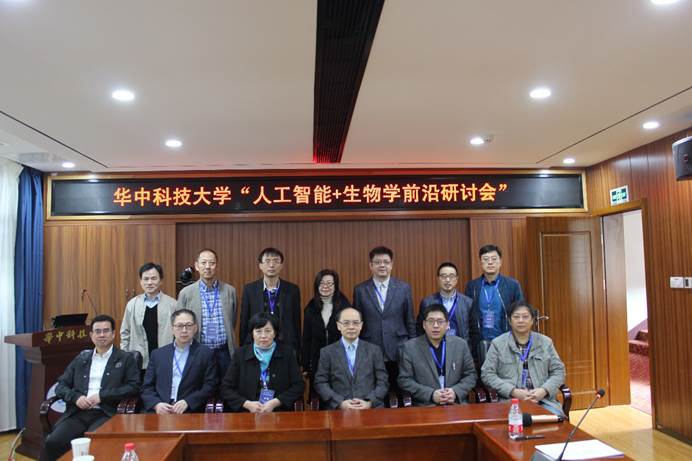(Correspondent Xiaodan Tan, Yujie Gou)The Seminar on Frontiers of Artificial Intelligence and Biology was successfully held in Conference Room 211, Building 1, International Academic Exchange Center on October 25, 2020. The consultation was co-sponsored by Science and Technology Development Institute and Technology and Personnel Department, and jointly hosted by the School of Life Science and Technology and Artificial Intelligence Biology Center. The theme of this consultation is "What important biological problems should AI actually solve on a priority basis?", which aims to promote the cross-fertilization of AI and Biology and the development of AI-related fields in our university.
The seminar was hosted by Prof. BiFeng Liu, Executive Vice-President of the School of Life Sciences. Attendees included Prof. Xia Li, Principal of School of Bioinformatics and Technology, Harbin Medical University; Prof. Peng Shi, Deputy Director of Kunming Institute of Zoology, Chinese Academy of Sciences; Prof. Luonan Chen, Shanghai Institute of Life Sciences, Chinese Academy of Sciences; Prof. Zefeng Wang, Shanghai Institute of Nutrition and Health, Chinese Academy of Sciences; and Mr. Taijia Jiang, Director of Biomedical Data Center, Institute of Basic Medical Sciences, Chinese Academy of Medical Sciences. Prof. Jianfeng Liu, Prof. Cong Ma, Prof. Anyuan Guo and Prof. Yu Xue from College of Life Sciences, and Prof. Yi Xiao , Prof. Shengyou Huang from the College of Physics participated in the symposium.

The consultation began with a speech by Tingjiao Zhang, Director of the Foundation Office, and President Bifeng Liu, who welcomed and thanked the guests. In his speech, President Bifeng Liu introduced the remarkable achievements we have made at the intersection of life sciences and artificial intelligence, and took an outlook on the development of AI biology afterwards.

Subsequently, Focusing on the theme of "What are the important biological problems that AI should solve on a priority basis", the invited guests gave excellent academic presentations, introducing the different research directions of the integration of AI and biology, achievements and future plans, and discussing and giving suggestions on the unsolved scientific problems in the field.
Among them, Professor Xia Li reported a number of well-known cancer-related databases of non-coding RNA on biomedical big data mining and precision medicine; Researcher Shi Peng introduced the animal group research of echolocation to reveal the relevant molecular characteristics of animals, and new clusters for prediction; Researcher Luonan Chen specifically explained the method of using space-time conversion equations and automatic reserve pool learning machines to achieve high-dimensional scene prediction; Researcher Zefeng Wang shared its CPU-GPU heterogeneous framework and used it for TCGA full transcriptome In-depth reanalysis and cancer retyping research ideas; Researcher Taijiao Jiang reported the gene rearrangement and fine typing methods for discovering the origin and evolution path of the H7N9 virus, and the influenza reassortment database established.
Professor Jianfeng Liu, Professor Yi Xiao, Professor Yu Xue, Professor Cong Ma, and Professor Anyuan Guo from our school also shared Functional Toolbox for GPCRs, AI for Biomolecular Structures, AIBIO: from PTM to COVID-19, neurosynaptic secretion mechanism research, genes The bioinformatics mining and application of expression data are representative research results that are highly recognized by domestic and foreign colleagues, and they have in-depth and lively discussions with the participating colleagues.
Finally, the experts discussed the future development of artificial intelligence biology. They agreed that artificial intelligence biology, an emerging interdisciplinary research field, is highly forward-looking and feasible, and its related progress is expected to change the current mainstream life sciences ,and to reveal the nature of more complex life phenomena.